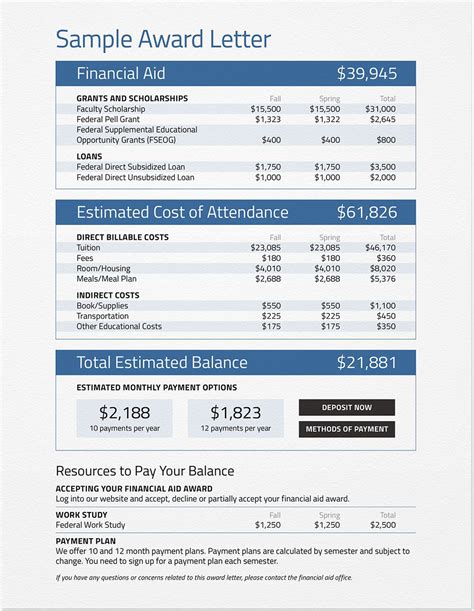Navigating the world of financial aid can be overwhelming, especially when you receive an award letter. This comprehensive guide will demystify award letters, providing you with an example and decoding its key components.

Understanding Your Financial Aid Award Letter
A financial aid award letter is an official document from a college or university that outlines the types and amounts of financial assistance you have been awarded. It should clearly state the following details:
- Total Cost of Attendance (COA): This is an estimate of the cost to attend an institution for a specific academic year, including tuition, fees, room and board, books, and other necessary expenses.
- Estimated Family Contribution (EFC): This is a calculation by the federal government that determines your family’s financial strength and ability to contribute towards your education.
- Financial Need: This is the difference between the Cost of Attendance and the Estimated Family Contribution.
- Gift Aid: This includes scholarships, grants, and other forms of financial assistance that do not need to be repaid.
- Self-Help Aid: This includes loans and work-study programs, which require you to take on debt or work part-time to pay for your education.
- Award Details: This section provides a breakdown of each type of aid awarded, including the amount, source, and any terms and conditions.
- Acceptance and Deadline: The letter will clearly state whether you must accept or decline the award and provide a deadline for doing so.
Example Financial Aid Award Letter
Here is an example of a financial aid award letter:
University of California, Berkeley
Financial Aid and Scholarships
Recipient Name
Recipient AddressDear Recipient,
We are pleased to offer you the following financial aid award for the 2023-2024 academic year.
Estimated Cost of Attendance
| Category | Amount |
|---|---|
| Tuition and Fees | $36,000 |
| Room and Board | $15,000 |
| Books and Supplies | $1,500 |
| Other Expenses | $2,500 |
| Total Cost of Attendance | $55,000 |
Estimated Family Contribution
| Source | Amount |
|---|---|
| Federal Formula | $20,000 |
Financial Need
| Amount | |
|---|---|
| Financial Need** | $35,000 |
Financial Aid Award
| Type of Aid | Amount | Source |
|---|---|---|
| Federal Pell Grant | $6,000 | U.S. Department of Education |
| Cal Grant B | $4,000 | State of California |
| Berkeley Scholarship | $5,000 | University of California, Berkeley |
| Federal Stafford Loan | $10,000 | U.S. Department of Education |
| Federal Work-Study | $5,000 | U.S. Department of Education |
Total Financial Aid Award
| Amount | |
|---|---|
| Total Financial Aid Award | $30,000 |
Acceptance and Deadline
To accept this award, please sign and return the enclosed acceptance form by June 1, 2023.
Congratulations! We are excited to have you as a member of the Berkeley community.
Sincerely,
Financial Aid Office
Tips and Tricks for Navigating Your Financial Aid Award Letter
- Review your award letter carefully: Ensure that you understand the types and amounts of aid you have been awarded and the terms and conditions associated with them.
- Compare award letters from different schools: If you have received multiple offers, compare the total cost of attendance, financial aid packages, and deadlines to make an informed decision.
- Contact the financial aid office with questions: Don’t hesitate to ask for clarification or guidance if anything is unclear.
- Consider your financial situation: Evaluate your award letter in the context of your family’s financial resources and other potential sources of income.
- Negotiate if necessary: In some cases, you may be able to negotiate with the financial aid office to increase your aid or adjust the terms of your loans.
- Complete the FAFSA early: The Free Application for Federal Student Aid (FAFSA) is the gateway to federal and state financial aid. Submitting it early gives you the best chance of receiving the most generous aid package possible.
- Explore other sources of funding: In addition to financial aid, there are other ways to pay for college, such as scholarships, grants, and private loans.
Common Mistakes to Avoid
- Ignoring your award letter: Failing to review and accept your award letter could result in you missing out on financial aid that can help you pay for college.
- Not fully understanding the terms of your loans: Taking on too much debt without understanding the repayment terms can lead to financial difficulties down the road.
- Relying solely on loans: While loans can be a valuable tool for paying for college, they should not be your primary source of funding.
- Not exploring all of your options: There are numerous resources available to help you pay for college. Don’t limit yourself to just the financial aid your school offers.
- Missing deadlines: Failing to meet deadlines for accepting your award or submitting the FAFSA can result in you losing out on financial aid opportunities.
Your financial aid award letter is a crucial document that will help you plan for the cost of college. By understanding its components and reviewing it carefully, you can make informed decisions about your financial future.
